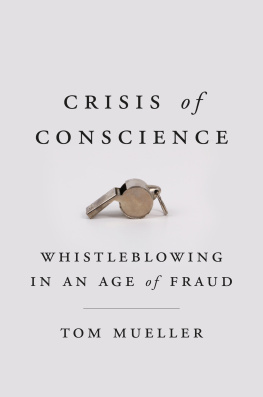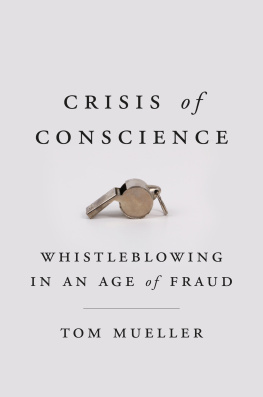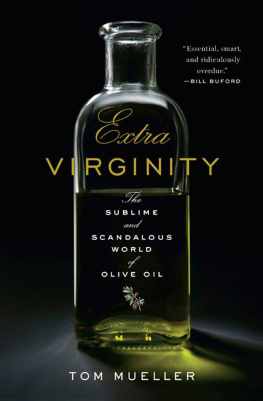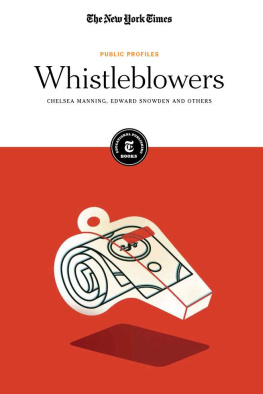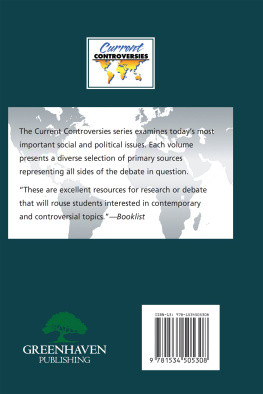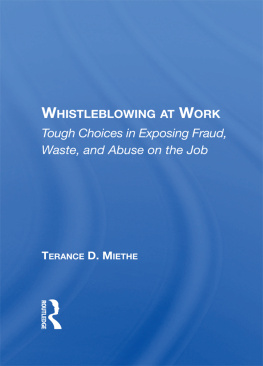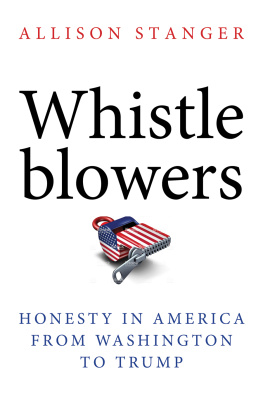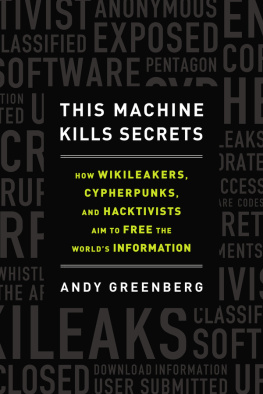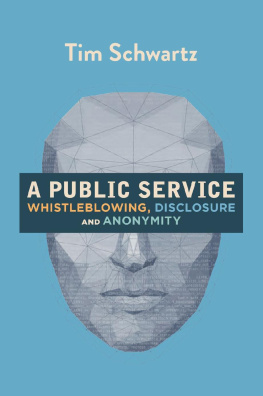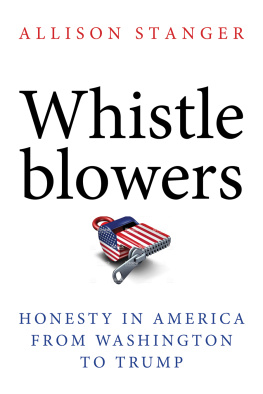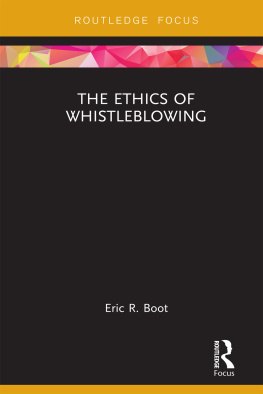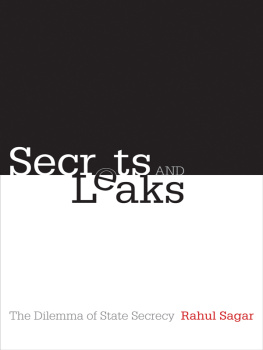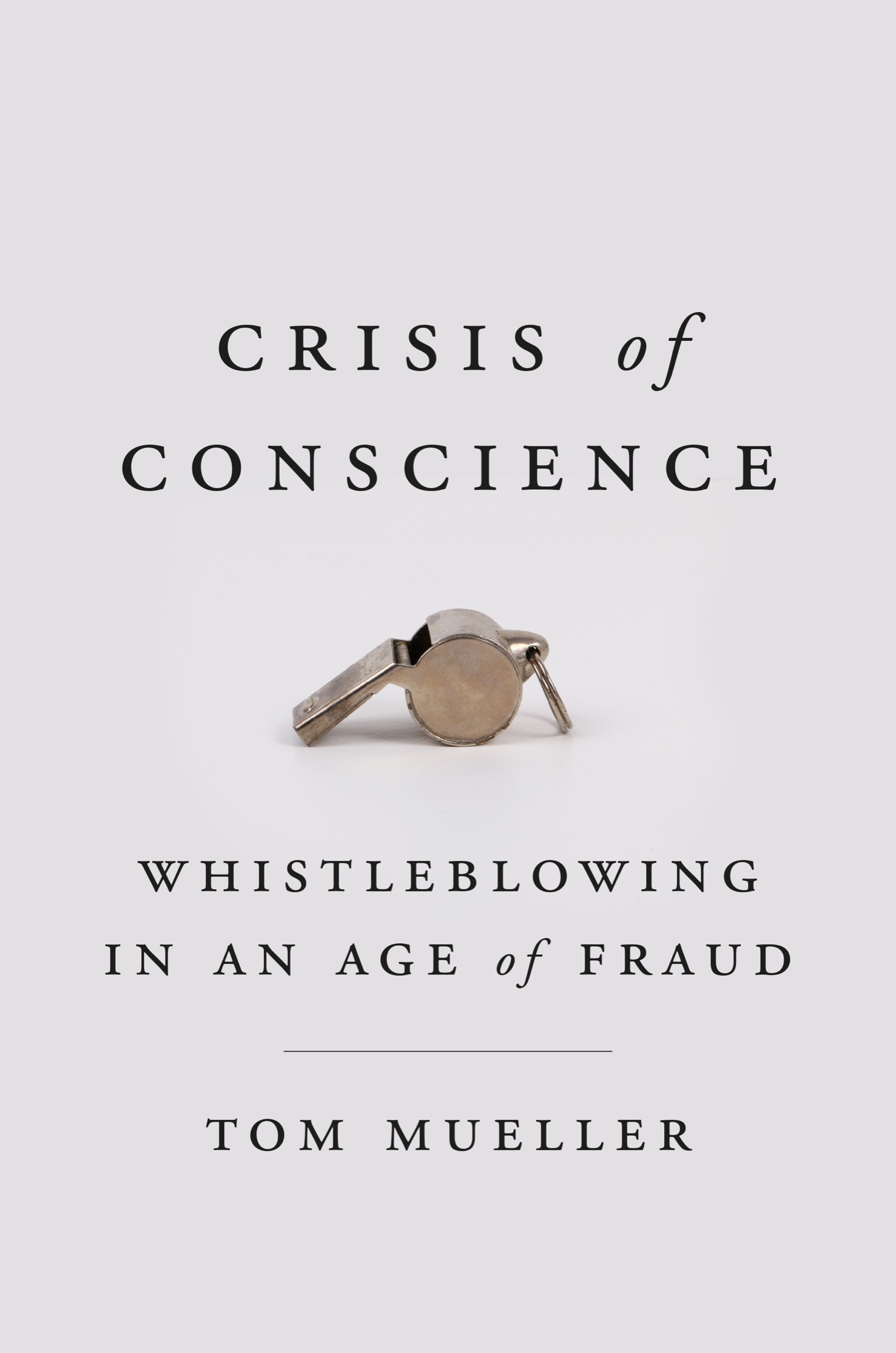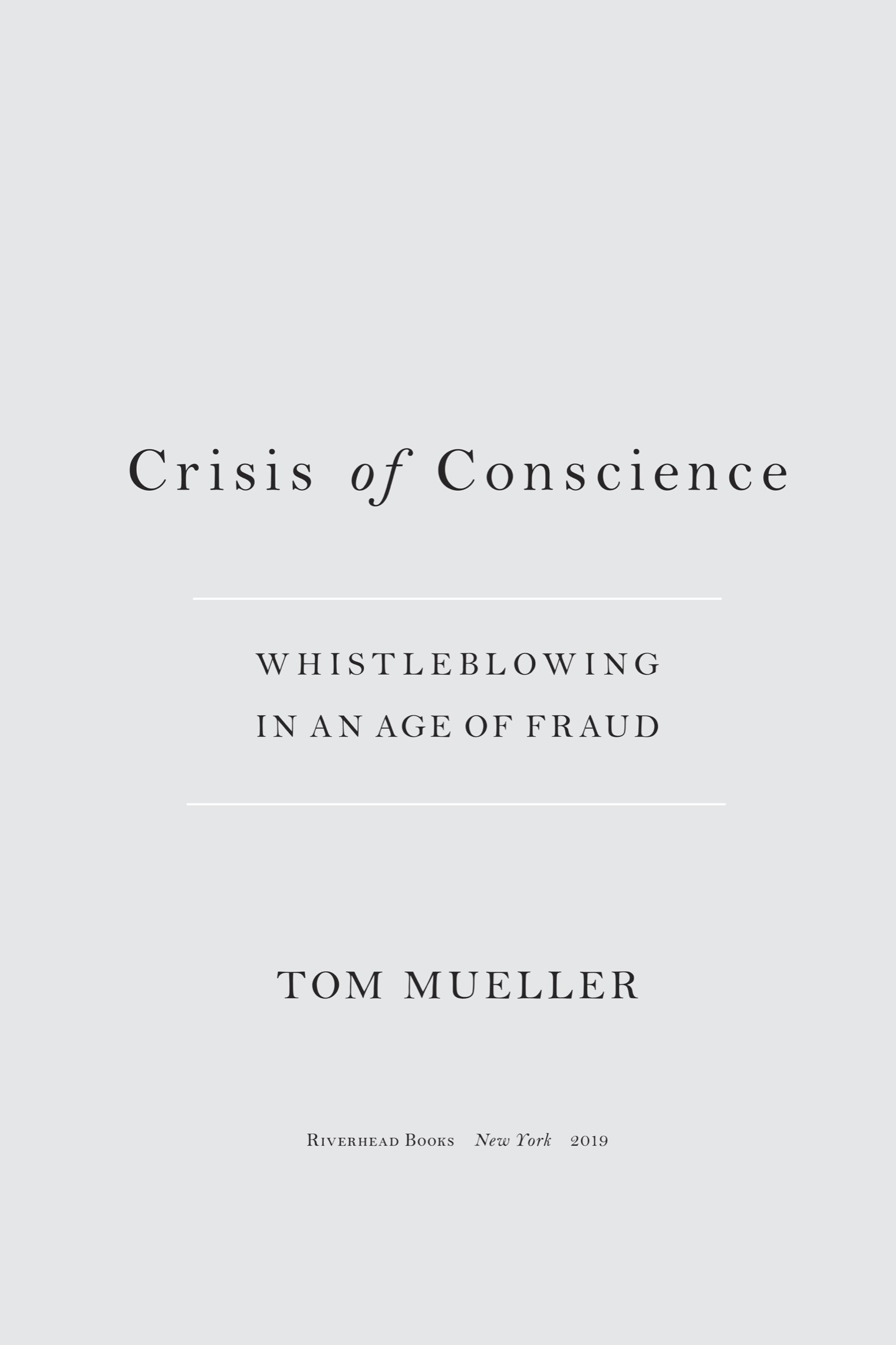Penguin supports copyright. Copyright fuels creativity, encourages diverse voices, promotes free speech, and creates a vibrant culture. Thank you for buying an authorized edition of this book and for complying with copyright laws by not reproducing, scanning, or distributing any part of it in any form without permission. You are supporting writers and allowing Penguin to continue to publish books for every reader.
Names: Mueller, Tom, 1963 author.
Title: Crisis of conscience : whistleblowing in an age of fraud / Tom Mueller.
Description: New York : Riverhead Books, 2019. | Includes bibliographical references and index.
Identifiers: LCCN 2019016249 (print) | LCCN 2019980032 (ebook) | ISBN 9781594634437 (hardcover) | ISBN 9780698405103 (ebook)
Subjects: LCSH: FraudUnited States. | Whistle blowingUnited States. | CorporationsCorrupt practicesUnited States. | Administrative agenciesCorrupt practicesUnited States. | Political corruptionUnited States. | Corruption investigationUnited States.
Classification: LCC HV6695 .M84 2019 (print) | LCC HV6695 (ebook) | DDC 364.16/30973dc23
A time comes when silence is betrayal.
Martin Luther King Jr., Beyond Vietnam, a speech delivered at Riverside Church, New York City, April 4, 1967
CHAPTER 1
Becoming a Whistleblower
Resolved, that it is the duty of all persons in the service of the United States... to give the earliest information to Congress or other proper authority of any misconduct, frauds or misdemeanors committed by any officers or persons in the service of these states, which may come to their knowledge.
Legislation of July 30, 1778, reprinted in Journals of the Continental Congress, 17741789
Some of the worst crimes, and the most wrenching tests of character, happen by slow degrees, steady as sunrise. This is the story of how Allen Jones, an investigator at the state Office of the Inspector General in Harrisburg, Pennsylvania, moved in gradual, irrevocable steps to a crossroads in his life, and one day made a fateful choice.
On July 23, 2002, Jones learned that a check for $2,000 had recently been deposited into an unnamed bank account used by Steven J. Fiorello, the states chief pharmacist. Hardly a remarkable sum, yet Joness instincts, honed by years of investigating multimillion-dollar fraud schemes, were aroused. Fiorello and his superiors had failed to register the accounts existence with the state comptroller, which was a felony offense in Pennsylvania. Worse, the check was from Janssen Pharmaceuticals, a subsidiary of Johnson & Johnson. Since Fiorellos job was to choose which drugs were available for purchase by state hospitals, foster homes, prisons and elder care facilities throughout Pennsylvania, this money looked suspiciously like a bribe.
It was the first of a series of Oh my God! moments I had over the next months and years, Jones remembers. That check was like a loose pebble that started an avalanche.
Today Jones is a slope-shouldered, rough-handed man of sixty who resembles a heavyset Chuck Norris. His close-cropped, grizzled beard is stained with nicotine around his mouth, and his face is reddened by weather. Beneath gray bangs and seams of concern across his forehead, his clear green eyes seem wary, though as he gets to know you they occasionally glint with humor. Jones likes to build things in wood and stonehouses, barns, drywall terracingand spends much of his time alone in the forested foothills of the Appalachian region of central Pennsylvania, where he grew up. This is Pennsylvania Dutch country, where the Amish drive horse-drawn buggies with two gas lanterns for headlights, and the barns and clapboard houses stand square across the roof beam but often need a coat of paint. Jones grew up working with the Amish, and has some of their calm reserve. He chooses his words judiciously, like a good mason laying bricks, like a man accustomed to living at hazard before the law. He even swears judiciously: The only way to accurately describe my state of mind at that moment, he says of his realization that his own office was covering up massive pharmaceutical fraud, was fucking devastated. Jones has many friends who drop by his cabin at odd hours, to drink a beer and swap deer-hunting stories, but occasionally hell leave their company, walk out on his back porch and look over the frozen pond into the bare woods beyond, drawing hard on a cigarette.
Jones continued exploring Fiorellos finances and found more checks written by Janssen, as well as by two other pharmaceutical companies, Pfizer and Novartis. As an investigator I was taught to look for the big picture, Jones says. Not just what happened, but why it happened. So I started looking into what these drug companies were doing in Pennsylvania in the first place. The funds were being used to support and expand the Pennsylvania Medication Algorithm Project (PennMAP), a protocol to diagnose and treat bipolar disorder, schizophrenia, ADHD and major depression. This protocol required doctors in all state facilities to treat these conditions with a new generation of drugs, called atypical antipsychotics, in preference to older, generic antipsychotic medications that had previously been prescribed. Jones discovered that the protocol was a carbon copy of one being used in Texas, TMAP, which Johnson & Johnson and other pharmaceutical companies had launched in the late 1990s, with generous funding to mental health officials, who in return had often helped market the drugs. Jones also found evidence that Johnson & Johnson, together with acquiescent state officials, was rolling out similar programs in at least ten other states.
The more Jones learned about these protocols, the more disturbing they seemed. They made Risperdal and other atypical antipsychotics the treatment of choice for a wide range of mental disorders. Since atypicals were far more expensive than first-generation antipsychoticsRisperdal cost about 45 times more than previous medicationsTexas Medicaid payments for atypicals had skyrocketed from $28 million in 1997 to $177 million in 2004. The same was happening in Pennsylvania: between 2000 and 2003 alone, Medicaid spending for atypical antipsychotics rose by 55 percent.
Yet despite their cost, Jones discovered that much of the supposedly impartial medical research used by pharmaceutical marketers to convince state officials that Risperdal and other atypicals worked better than older medications had been ghostwritten by the pharmaceutical companies. Unbiased clinical trials not only suggested no increase in effectiveness but revealed serious side effects caused by atypicals, which the pharma-sponsored studies had downplayed. Risperdal could cause muscle spasms, medically serious weight gain, and an increased risk of diabetes, stroke, pituitary tumors and death. Patients on Risperdal might develop disfiguring and irreversible twitching of the face, torso and limbs. Some male patients grew lactating breasts, and required mastectomies. Though Johnson & Johnson apparently concealed major research from the Food and Drug Administration (FDA), the FDA knew enough about Risperdal to forbid the company from claiming that the drug was superior to earlier antipsychotics; to require warnings of the neurological side effects, weight gain and diabetes it could cause; and to impose, in one demographic, the agencys strongest, or black box, warning, reserved for drugs with life-threatening side effects. The FDA approved extensive use of the drug only for adult schizophrenics. Johnson & Johnson, Jones found, had ignored many of these prohibitions, and downplayed or denied them in its marketing campaigns; in Texas, the company had aggressively marketed Risperdal for children, adolescents and elders, to treat anxiety, insomnia, mood disorders, agitation and mild emotional discomfort. In fact, the Texas protocol mandated Risperdal for these conditions in state prisons, hospitals, reform schools and nursing homes, whose captive patient populations had little or no say in their medical care. Now the company and Pennsylvania officials were starting to impose the same regime in Joness home state.

